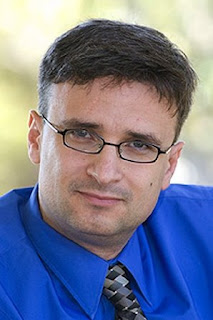 Dr Krassen Dimitrov MSc Sofia PhD Baylor College of Medicine Single Molecule Nanotechnology Professor Dimitrov is in the process of building a diverse multidisciplinary group with expertises in nanoelectronics, electrochemistry, molecular biology and microfluidics. He has done a Ph.D. in Biochemistry at Baylor College of Medicine in Houston, and a postdoctoral fellowship in Leroy Hood’s group in Seattle. Prior to joining AIBN Dr. Dimitrov was the Founder and Chief Scientific Officer of NanoString Technologies, Inc. | A new technology with research and clinical application including the early detection of disease has been invented and developed by University of Queensland researchers. Dr Krassen Dimitrov, from UQ's Australian Institute for Bioengineering & Nanotechnology, has developed fluorescent “barcodes” called nanostrings, offering greater sensitivity and accuracy than current detection methods. The research has been published in the prestigious international journal Nature Biotechnology. Dr Dimitrov said nanostrings bind to RNA molecules for digital gene expression analysis. “Because this system can count the exact number of biomolecules present we can get an extremely accurate and sensitive picture of gene expression at a particular point in time,” Dr Dimitrov said. “This quantitative data is superior to other gene expression systems such as microarrays, which rely on the analogue measurement of fluorescence and therefore are less accurate and have a limited range. “The nanostring is an important technological development in both clinical and research settings. |
He said the technology is based on a non-enzymatic process which reduces the chance of bias and is more robust in a variety of different conditions.
Dr Dimitrov is currently working on the next step, which will be new nano-barcodes that will further reduce the cost and improve sensitivity and usability.
This technology has been commercialised in Seattle by a company founded by Dr Dimitrov in 2003.
The AIBN is a multi-disciplinary research institute based at UQ, which brings together the skills of world-class researchers in the areas of bioengineering and nanotechnology to produce positive health and environmental outcomes such as biomedical delivery; bio-devices; tissue regeneration; and cell therapies.
Media: Contact Dr Krassen Dimitrov (07 3346 3880, k.dimitrov@uq.edu.au) or Russell Griggs (07 3346 3989).














No comments:
Post a Comment